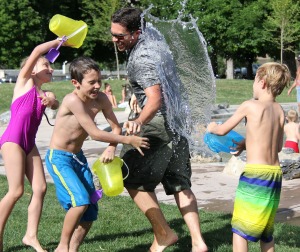The Power of Family Fun and Games
Children’s brains develop rapidly during their early years. Children are constantly learning about the world around them and their brains are making important connections that will help them be successful as they grow older. Preschoolers are expanding their skills and abilities by trying new things, testing boundaries and asking questions about everything! They are developing their short term memory, attention span and self-control. Preschoolers start to show independence by wanting to choose their own clothes or doing tasks on their own. They start to use their self-help skills by dressing themselves, tying their shoes and getting themselves ready for bed. They start to practice their growing social skills by interacting with other children, making new friends and negotiating social situations.
During this time, it is important that parents and caregivers give children opportunities to practice these new skills and allow children unscheduled playtime to explore their world. As a parent or caregiver it is important that you talk with your child often and ask them questions. Here are some fun ways from Michigan State University Extension that you can use to help boost your child’s brain development.
Thinking games:
- Bring out buttons of all different sizes and shapres. Ask your child to help you sort the buttons by color, size and number of holes.
- Make up silly stories, and ask your child to add sounds and motions to go with the story. Ask him to tell the story back to you. Help your child make up his own story with sounds and motions.
- Pick out four small toys with your child. Place them in front of your child, and ask them to close their eyes. Take one away. Have your child guess what is missing. You can increase the number of toys or change the toys as the game continues.
- Describe an object in the room. For example, “All of the walls in this room are white.” Ask your child if this is true or false (you may have to explain how to understand what true and false means). Reverse the game and have your child try asking you to identify true or false statements he makes.
Active Games:
- Point to different parts of your body as he names them. Ask him what those parts do. Then ask him to point to parts of his body with other parts, for example, “Touch your knuckle to your ankle,” or “Touch your ear to your knee”.
- Make a body movement and ask your child to copy it. Then add another movement so that the two are combined. Continue to add movements and praise your child for remembering as many as she can.
- Listen and dance to all types of music together. You can even make homemade instruments from materials around the house; for example, place beans in an empty plastic bottle to make shakers. Have a parade around the house.
- Go on a silly movements walk. Yell out a direction (“hop,” “walk on one foot,” “skip”) and try them together. Let him yell out the commands too.
Language Games:
- Stop to look at the pictures while you are reading. Ask your child questions like, “What colors is he wearing?” or “What do you think will happen next?”
- Pick up an object like a dinner plate. Ask your child what else goes with it. She may answer a cup, fork, knife or spoon. Try this with other objects around the house.
- Play “I spy” together. Describe an object you see and have your child guess what it is. Reverse roles and let your child try to find and explain an object so you can guess.
- Explore and talk about all of the ways you can say goodbye. For example, you can hug, kiss, shake hands, or say things like “Bye,” “See you later,” or “Have a good day”. Talk about how you would say goodbye to different people.

